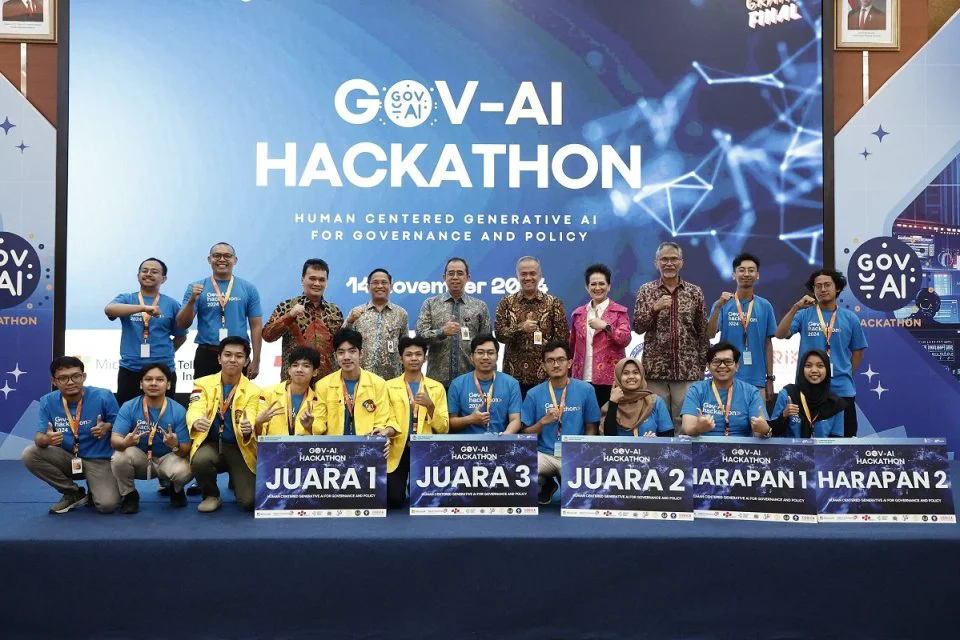Indonesia is entering a new era of digital transformation, with the government increasingly turning to artificial intelligence (AI) to enhance public services. The 2024 GovAI Hackathon, a collaboration between the Ministry of Finance, Ministry of Foreign Affairs, Ministry of Health, Microsoft Indonesia, Himbara, and Telkom Indonesia, is a testament to this progress. The competition, which focused on AI solutions for government service improvements, attracted a staggering 191 teams, a significant leap from the 93 teams in the previous year. This growth signals the increasing role AI is set to play in public administration.
The event centered on four key challenges faced by the government: tackling stunting and improving the nutrition of schoolchildren, building more integrated and responsive digital public services, empowering SMEs for export, and ensuring transparency in state financial management. Through the hackathon, officials sought innovative ways to solve these critical issues using AI technologies.
According to Agus Rofiudin, Chief Information Officer at the Ministry of Finance, "With over 72% internet penetration in Indonesia, the potential for AI to improve public services and the quality of life for citizens is immense." The hackathon aimed to harness this potential by bringing forward AI-driven solutions that could be integrated into government programs.
The hackathon began in October 2024 with AI training sessions open to the public. Over 1,000 participants attended these online classes, which prepared 147 teams to submit their AI solutions. Ten of these teams were selected for further development, receiving mentorship from Microsoft and the Ministry of Finance’s Data Analysis Community (MoF-DAC), as well as other government bodies. These teams worked with Microsoft Azure technology to build Minimum Viable Products (MVPs) based on their concepts. Ultimately, five solutions were chosen to be implemented in government projects.
One standout solution was NuSantap, developed by UINNOVATOR. This platform integrates generative AI with computer vision to offer personalized meal recommendations for schoolchildren, taking into account individual nutritional needs and local food availability. It also uses AI to detect signs of nutrient deficiencies, making it a valuable tool in tackling Indonesia’s child nutrition issues.
Another winner, DIPLOMAT-AI, created by Network AI, helps Indonesian SMEs assess export opportunities using AI-powered market intelligence. The platform offers in-depth market analysis, including trade regulations and potential barriers in foreign markets. It also features a chatbot that provides real-time answers to questions about tariffs, trade regulations, and market trends, making it a one-stop solution for businesses looking to expand abroad.
Ember Proyek’s AI solution utilizes satellite imagery to map carbon absorption potential, which could support Indonesia’s environmental policies. By identifying areas with high potential for carbon sequestration, this technology could help the country meet its sustainability targets while driving climate-related innovations.
Another solution, Trace.AI by AI4Indonesia brings transparency to government procurement. Using generative AI, it automatically checks budget proposals, compares pricing, and flags potential markups. This tool aims to enhance efficiency and accountability in public procurement processes, helping the government manage resources more effectively and reduce the risk of corruption.
Lastly, Ainara by Timses AITIES is an AI-powered solution for managing village funds with a focus on transparency. By integrating blockchain, smart contracts, and AI, Ainara ensures that funds are disbursed only when conditions are met, preventing misuse and promoting public trust. The system also includes a dashboard for real-time monitoring of fund distribution, fostering greater community engagement and oversight.
These solutions are not just theoretical. They represent real potential for improving public service delivery in Indonesia. As Acep Somantri, Expert Staff at the Ministry of Foreign Affairs, noted, "The ideas generated at the hackathon showcase AI’s vast potential to address the critical issues facing Indonesia. This collaboration between the government, private sector, and academia is key to accelerating digital transformation and improving public welfare."
The rapid growth of AI adoption in Indonesia, as highlighted by Maya Arvini, Director of Microsoft Indonesia’s Public Sector, is a clear indication of the country’s readiness for digital disruption. "In Indonesia, 92% of knowledge workers are already using generative AI at work, outpacing global and Asia Pacific averages," Arvini pointed out. This momentum is helping lay the foundation for Indonesia’s ambitious digital future, paving the way for the country’s vision of becoming a digital powerhouse by 2045.
Read More






 Tuesday, 03-03-26
Tuesday, 03-03-26







